For now, the ability of Israelis to travel to all countries has been restored and the skies have been reopened for vaccinated foreigners to visit. At press time, entrance to Israel is still prohibited for vaccine-free non-citizens. While sharing the hope that the skies will remain open moving forward, it’s impossible to predict how long the freedom to travel will remain in place.
The entry and exit policy during the pandemic era is decided by an inter-ministerial team of representatives from the Health Ministry, the Foreign Ministry and the Interior Ministry, explained Jeremy Sharon, media adviser to Diaspora Affairs Minister Nachman Shai.
 Learn how to buy your home in Israel with confidence
Learn how to buy your home in Israel with confidenceWhile many olim are now able to reunite with family and friends, we took a look back at how corona-era travel restrictions have impacted families.
NOTE: The following stories represent the experiences of thousands of others who have faced similar situations.
Family health crisis
Edda Weissberg and her family have been dealing with their youngest daughter’s serious illness for years. The Weissbergs made aliyah from Baltimore and live in Ma’ale Adumim.
Weissberg shared, “We have to travel back and forth to the US in order to receive life-saving treatment and evaluations from top doctors in America. Without such treatment, my daughter’s life would have been totally and permanently destroyed and possibly [ended in] death.” As dual citizens, they were able to travel back and forth until Israel declared the US a red country.
A different aspect of Israel’s corona policy has adversely affected the Weissberg family. “My daughter and I got vaccinated through Pfizer in America, but Israel refused, and still refuses to this day, to accept the vaccinations. We are considered unvaccinated [and] needed to stay in quarantine for two weeks. This meant losing even more work and my daughter not being able to start school on time.”
Weissberg, a psychologist and her husband, a psychiatrist “are independent contractors (i.e., if we don’t work, we don’t get paid). Israel’s travel restrictions, especially the latest ones, have significantly impacted us and cost us a lot of money.”
The complete closure of travel to the US hit the Weissbergs especially hard. “We were supposed to start the next round of tests and treatments after [January 1]. We planned everything around that.
“Our patients and workplaces have gone way past their amount of understanding regarding the significant amount of time that we have had to take off because of our daughter’s illness. I have lost tons of patients and my husband was let off from one place of work, and other places are also one step away from letting him go.
“When we planned to go this time, we promised people that it would be for a much shorter period of time.” When Israel announced the skies to America would close, the Weissbergs made a decision to “pick up and leave immediately” rather than try their luck with the appeals process and risk canceled flights.
“Our daughter’s life was at stake. So we literally booked the only flight available, which left 12 hours later. We had to cancel all of our patients for the next two weeks, cancel work, leave our offices unlocked, and our [older] kids needed to come running home in order to help us pack, get COVID testing and drive us to the airport. Everyone lost work and had people and bosses fuming at them.”
In addition, crucial appointments that had been lined up to fight for the medical care their daughter needed in Israel had to be canceled. Expensive, last-minute arrangements had to be made for food and lodging in America. And since their vaccinations from the US are not recognized, when they return to Israel, they face more missed work and school due to quarantine requirements.
And that’s not the end of it.
“We have another daughter who is very ill and we were trying to arrange for her to join us during this trip so that she could get evaluated by the doctors [in America].” Due to their rushed departure, they were unable to arrange appointments in time and then she wasn’t able to leave Israel.
“So there went our dreams and plans of having our older daughter correctly diagnosed and get proper treatment recommendations so that she can start functioning.”
As for the older children they left alone in Israel, Weissberg said, “Thank God my kids are strong.”
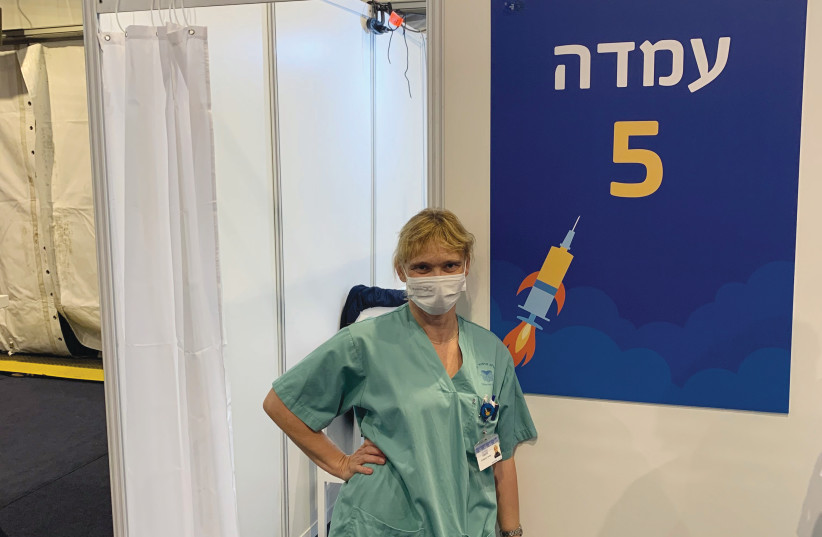
Leaving Israel behind
Martina Paletova made aliyah alone in 2015 and, as a result of being barred from seeing her European family, left her job as a nurse and made yerida (emigrated).
“I volunteered for work in the corona department in Ichilov and I volunteered to vaccinate at Kikar Rabin. During COVID lockdowns, I lived in Jerusalem and paid for a taxi to be able to work in Tel Aviv. I slept often in the hospital between 12-hour shifts since I did not have transportation to return home,” Paletova explained.
After tangling with the constantly changing government rules, Paletova had enough. “In December, I quit my job that I loved very much and returned to Prague.
“I am disappointed in Israel’s treatment of olim. I worked hard to make aliyah. I paid for my education; I got nothing handed to me for free. I speak three out of four languages needed in Israeli hospitals, I did my best to help out during COVID, working and volunteering as a nurse.
“My parents could not fly in to see me for almost two years. It simply became really hard to live in a country that can stop me from crossing the border with little warning, a country which tells me if and when I can see my mom,” she explained.
<br>Burying parents on Zoom
Betty Atlas is an American living in New York. Her parents made aliyah in the 1980s. In January 2021, both her elderly parents got sick with COVID and passed away within 15 days of each another. She was denied permission to fly in for her mother’s burial because of confusion over which kind of corona test was acceptable for international travel.
“By the time my father passed two weeks later, the borders were completely sealed and I was told I wouldn’t get a permit. It was pretty devastating having to bury my parents over Zoom.
“Once things opened up in November, my sister and I immediately booked tickets to fly on December 22 for [an unveiling]. When the country was shut again, Atlas was told, “Since I no longer have any first-degree relatives in the country, I will not be given permission to fly. It is still very devastating to know that I was not able to give my parents a burial in person.”
Hopefully, Atlas will at least be able to be in Israel for her parents’ first yahrzeit.
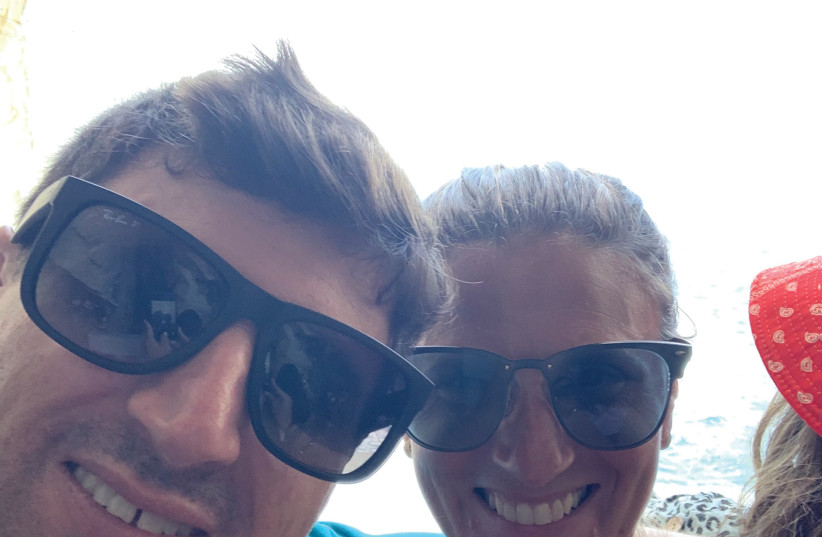
Siblings sharing the burden
Tova Sprecher-Markowitz’s 71-year-old father has been dealing with serious ongoing mental health issues. Sprecher-Markowitz has been fighting to be able to come and care for him, but has been told “that mental illness is not the same as physical [illness] and my brother [who lives in Israel] can take care of my father.” This was the ruling, despite the fact that she made it clear that she is a psychologist and her brother is not.
Her request was denied by the Israeli consulate in New York. “My father has been asking me daily when I am coming to see him. I am his only daughter and only my brother is in Israel. No one else from his family is there. His wife of 26 years left him at the hospital and filed for divorce.
“It’s sick to me that a Birthright group flew in on December 21 and I was denied [permission] to see my sick father, who is now diagnosed with early dementia. His doctor wrote the only treatment for his condition is to have his family around him.
“Sadly, my father was readmitted to [the hospital] due to physical issues. I would have been there to hold his hand. He begged my brother not to leave but it’s too much for one person. My brother has been handling this on his own since June 2020.
“I honestly feel like my heart is broken. I was so proud for Israel to host the Miss Universe pageant, but so saddened and angered that I was deemed a threat and denied entry, with my triple vaccine and natural immunity, with all of my immediate family having made aliyah.
“My father will likely never recover what the strict lockdowns stole from him. Years of his life! I am a very positive person, but my heart is broken and I am struggling to remain positive.
“I had always planned to make aliyah one day and encouraged my children to do so; this experience has forced me to reexamine those plans. I am scared of being locked away from my children one day. I believe Israel is the place all Jews should live, but under these harsh rules I am not so sure it’s the wisest thing to do for people who have close family abroad,” she said.
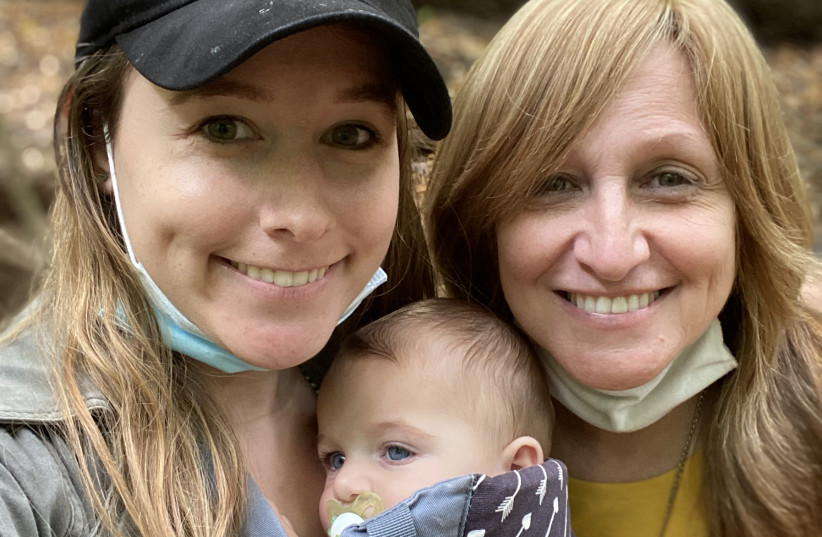
Giving birth during a pandemic
Zahava Wesfield made aliyah in 2012 and lives in Givat Shmuel. At the very beginning of COVID, in April 2020, she gave birth to her second child. With a husband working 26-hour hospital shifts, a toddler at home because pre-schools were closed due to the lockdown, and a difficult physical recovery, Wesfield could have used her mother’s help.
Lockdown restrictions made it all but impossible for anyone to come to her aid. “I just remember not being able to lift my toddler into her crib one night and breaking down in tears, wondering how I’d get through it.”
Now expecting her third child in March, Wesfield said, “I am severely traumatized from the experience I had at the start of the pandemic and have a lot of anxiety that I’ll find myself in a similar situation when this baby arrives, with my family across the world, unable to help.
“I’ve noticed that every time the borders shut down again, it takes some time for the Knesset to remember that births are an important reason for grandparents to travel to Israel, not simply because they should have the opportunity to meet their grandchildren, but because, since the beginning of time, postpartum mothers have depended on their families to help them through their recoveries.”
Wesfield added that she “tried to leave for the US with both kids earlier on because [Israeli schools] were once again closing and I needed help. But I couldn’t get my baby a passport because of the insane backlog at the embassy. I felt like a prisoner.”
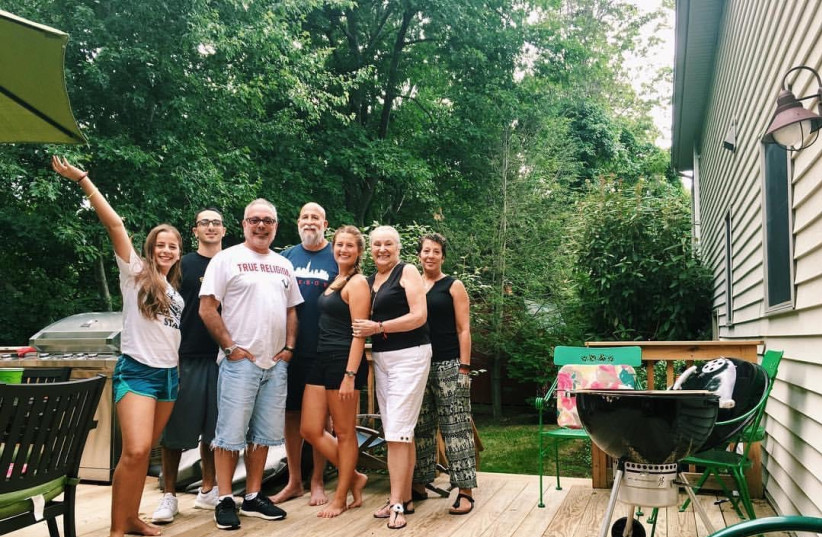
Alone in Israel
Hannah Salzberg made aliyah in 2018 and lives in Herzliya. As a single woman in her mid-20s, being far from family has been especially taxing. “The last time I saw my parents was October 2020. I have missed many holidays and family gatherings due to travel and work restrictions. I have [also] missed many things leading up to one of my best friend’s wedding, which should take place in October 2022, and I should be at – but who knows?”
Describing multiple family travel plans that were canceled due to travel restrictions, Salzberg said, “I cannot even begin to describe how disappointed I am that I am unable to share my life with my family. If it were not for my friends here in Israel, my extended family here, and for the invention of FaceTime, I’m not sure I could have stuck it out.
“My lifelong dream, since I was seven, was to one day make aliyah and I don’t regret it, but I do think that I may have emigrated [were it not] for my support system here.”
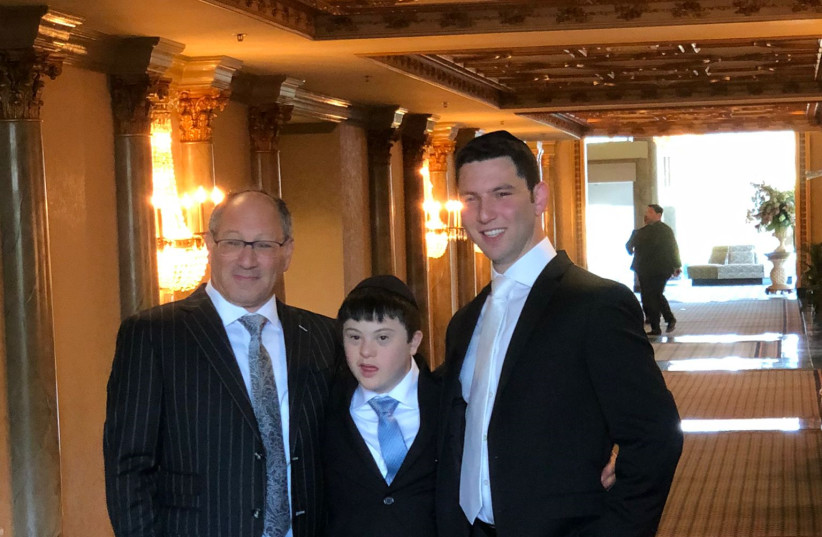
Special-needs brother
Tamar Sladowsky made aliyah from Baltimore and lives in Neriyah. After her mother’s death last year, Sladowsky took responsibility for caring for her teenage brother.
“The travel restrictions have impacted the mental health of my special needs brother. He is 16 and has Down’s syndrome. Our father lives in America and was scheduled to come to visit toward the end of December.
“My brother was counting down the days anxiously and excitedly, along with my own children and nieces and nephews. My whole family last saw my father in June, but as we lost my mother last year at a very young age, we especially look forward to seeing our father. My father also missed out on the opportunity to meet my new niece, his month-old granddaughter.
“The emotional impact is difficult. It is hard to know that family members are not ‘just a plane ride away’ like they used to be,” she shared.

A grandchild not met
Rabbi James Kennard is the principal of the largest Jewish day school in Melbourne. He and his wife Vicky have three children and nine grandchildren in Israel. “We encouraged our children to live in Israel, never imagining that we would be cut off from seeing them and the children for this long,” Kennard noted.
Australia’s travel restrictions prevented the Kennards from visiting their children and grandchildren, including one they haven’t yet met, for two years. The couple had a plan to visit Israel in December 2021, during Kennard’s school break.
“And then Israel closed its doors to Diaspora Jews, first for two weeks, then for another 10 days, then another, and now it seems the ban has become indefinite. We changed our tickets, changed them again, and now it’s not going to happen. We and the children are devastated.”
In early December, Kennard wrote to Prime Minister Naftali Bennett as a heartbroken father, objecting to the double standard of denying entry to Jews while allowing Miss Universe contestants to enter the country. In part, his letter reads:
“Do you realize what message you are giving to committed Jewish, Zionist, members of the Diaspora when you tell them that they are not welcome in Israel, that they cannot see the children and grandchildren that they have proudly sent to live in Israel, yet there is another rule for participants in a (frankly misogynist and objectifying) beauty competition?
“In short Mr. Prime Minister, why can I not enter the country to express my Zionism and to hug my children and grandchildren, but those organizing a competition that objectifies women can?
“For the first time in my life I find myself unable to support and defend the government of Israel. I hope that you will reply and give me reason to restore my faith in you and your country.”
The Foreign Ministry’s public affairs department replied in a way Kennard called “perfunctory.” Their response, which did not address his core concern, read, in part, “We understand your desire to travel to Israel with your children and grandchildren. However, the new restrictions on air travel to and from Israel have been introduced in order to prevent the spread of the new Omicron variant in the country.”
Kennard elaborated his frustration in a Facebook post when he wrote, “a far greater threat to the integrity of the Jewish people is the message that Israel is sending to the Diaspora – that you are not a part of us. A message that grows louder every day that the travel ban remains in place.
“Of course Diaspora Jews do not have the same rights as Israelis. I accept that, until I am able to live in Israel, I can be at best a secondary player in the unfolding Jewish destiny that is the Jewish state. But was this the Zionist dream, that Jews will be barred from Israel, by a Jewish government? Was this the vision of aliyah, that the price of moving to Israel would be to not see one’s parents again, that children cannot be hugged by their grandparents?
“…Although my words will not be heard, I continue to cry out; allow we who love Israel, whose hearts ache to be in Israel, to walk the streets of our holy land, to kiss our children, and to be a part, even a minor part, of your story. Heal the rift of our people before it is too late!”
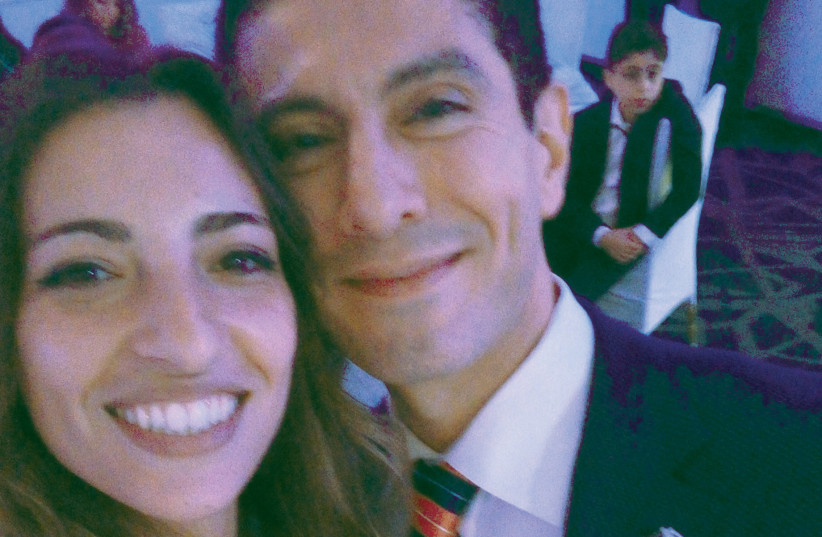
Keeping couples apart
Leah Baumann made aliyah from Italy 10 years ago. After completing the army, she went to the US where she earned a master’s degree. There she met her Jewish partner, Dr. Daniel Shifteh.
Baumann returned to Israel in February 2020, fully expecting Shifteh to follow shortly after. Despite the fact that Shifteh is Jewish and his sister lives in Israel, the couple has been dealing with bureaucracy to get him back to Israel. In December 2020, after finally getting “an appointment with the immigration authority in Tel Aviv,” Baumann brought every possible paper and was able to get Shifteh a tourist visa.
Since he was born in Iran and cannot provide a birth certificate, approval is complicated. “We tried to bring any paper possible – naturalization papers, old passports. Nothing worked, and without his birth certificate, there is nothing to do,” Baumann confessed.
His aliyah has been delayed and he is stuck in New York. One bureaucratic snafu after another prevents Shifteh from being able to get permission to enter Israel and, as Baumann explained, “meanwhile the US became red,” and it will take four to six months for Shifteh to be approved for aliyah.
“Not knowing when you can see someone is torture. There is not a day in the calendar that you don’t wait impatiently.”
Baumann said they feel “pushed to rush in decisions such as aliyah and marriage instead of just living our lives. Who wants to get married when both sides of our family won’t be allowed to come?”
As she sits in the apartment she intended to share with Shifteh, Baumann finds herself, “hoping that someone realized that closing the borders to people who want to live in Israel, to Jews who have a right to this land affects mostly new immigrants like me who moved here for Zionism, who served in the army, who have struggled until they could find a job and yet decide to stay and love this country.”
<br>The wounded Canadian
Allison Meyerowitz (not her real name) is a Canadian citizen whose only sister has been living in Israel for 20 years. Two of her sons served in the IDF and one son made aliyah after his army service.
Despite commuting back and forth between Israel and Canada for the past 15 years, she was denied permission to come on the occasion of the birth of her first Israeli grandson. Hiring a lawyer and submitting reams of paperwork resulted only in being denied five times.
“Not only did I miss the birth of my grandson, my father’s namesake, I also missed the brit, and the pidyon haben. The baby arrived in June and I finally was allowed into the country in August. I met my grandson when he was two months old, after fighting for 2.5 months.
“I cried constantly in those months. They were the darkest days of my life. Between the grief of losing my father and not being there for my son and daughter-in-law for the birth of my grandchild… I don’t even have the words. The process that Israel put me through broke my heart into pieces. I will never get those moments back. Israel took that from me.
“Frankly, I am at a loss. I am still in shock from the way I was repeatedly dismissed. The only thing I received were these generic letters of ‘sorry you have been denied.’ It was like no one even read the letters I sent or even looked at my application.
“All the while that this was happening, I know for a fact that Israel permitted seminary students to come and go as they pleased, [which added] insult to injury.
“This has deeply affected my feelings for Israel. Of course I am grateful and privileged to have grown up not knowing a world where Israel did not exist. I love the land of Israel with every fiber of my being, but the government? The people who made these callous decisions that so devastated me and my family, emotionally? That didn’t come to our aid with compassion at a time when a Jewish family needed compassion? No, I have not reached forgiveness.
“We won’t forgive easily, but I hope forgiveness will come. We won’t forget though. And for now, well, I am still sad, I am still angry, I am still hurting.”
<br>There were successes
Although cases like these are agonizing, fortunately, not all family stories ended in heartbreak. Yad L’Olim (yadlolim.org), an organization created in part to help olim navigate Israel’s bureaucratic hurdles, played a central role advocating for olim during the time Israel’s borders were sealed.
Tens of thousands of olim and their family members have been assisted by Yad L’Olim through their website, email and WhatsApp groups. The 17,500-member Facebook group Reunite Olim with Families was created in April 2021 with a goal to provide “support, help and resources for olim and their families to be reunited in Israel after being separated so long due to COVID travel restrictions.”
Yad L’Olim staff members actively monitor the group, answer countless questions and guide olim who are stymied by the constantly changing travel and quarantine regulations. Thanks to the tireless efforts of the Yad L’Olim staff and volunteers, innumerable families of olim were able to be reunited for weddings, births, shiva and other important occasions. ■
<br>Long-term solution needed
Diaspora Affairs Minister Nachman Shai is among those in the government advocating for the easing of travel restrictions. “I am acutely aware of the difficulties and suffering faced by olim and their relatives abroad caused by the travel restrictions imposed during the pandemic era.
“From the outset, my office and I have helped Jewish communities and individuals who requested to enter Israel as well as Israelis living abroad who faced particular problems entering the country with their foreign-born children.
“While the government must safeguard the safety of Israeli citizens, I have consistently argued that we must better enable those living abroad with deep ties to Israel to enter the country more easily.
“I made this request on several occasions to the prime minister and interior minister during the time in which the borders were closed, and voted in favor of lifting the restrictions when the issue was brought to the cabinet for a decision.
“Now that the skies have been reopened, I will work for a long-term, comprehensive solution to this issue to avoid a recurrence of these problems in the future.”
 Sign up for our newsletter to learn more
Sign up for our newsletter to learn more 